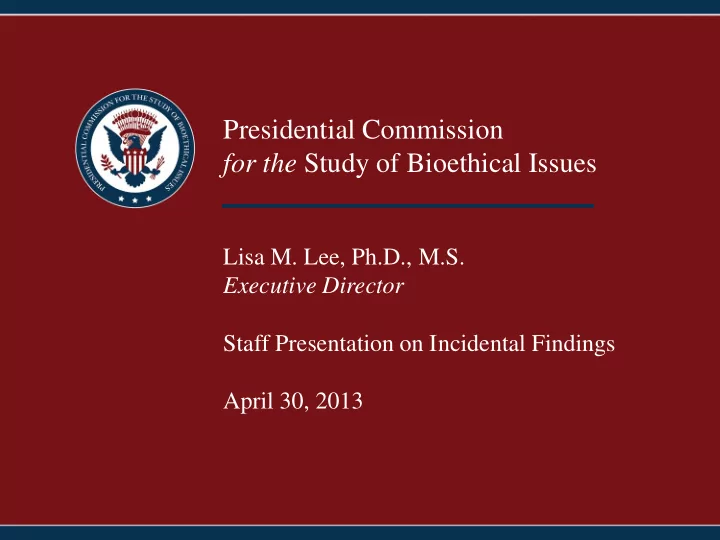

1 Presidential Commission for the Study of Bioethical Issues Lisa M. Lee, Ph.D., M.S. Executive Director Staff Presentation on Incidental Findings April 30, 2013
Overview 2 Scope • Definition • Practical, legal, and ethical considerations Modalities • Genetic and genomic testing • Imaging • Biological samples Contexts Clinical • Research • Direct-to-consumer •
Overview 3 Scope • Definition • Practical, legal, and ethical considerations Modalities • Genetic and genomic testing • Imaging • Biological samples Contexts Clinical • Research • Direct-to-consumer •
Scope: Incidental Findings Defined 4 Working definition • Information gathered in a clinical, research, or direct-to-consumer medical setting that was not the intended aim of the test • Potential clinical, reproductive, or health significance
Scope: Practical, Legal, and Ethical Considerations 5 Practical considerations • Return of results Legal considerations CLIA • Liability and defensive medicine • Ethical considerations • Ethical challenges of emerging technologies in clinical, research, and direct-to-consumer contexts • Ethical principles give rise to specific duties in each context
Overview 6 Scope • Definition • Practical, legal, and ethical considerations Modalities • Genetic and genomic testing • Imaging • Biological samples Contexts Clinical • Research • Direct-to-consumer •
Modalities: Genetic and Genomic Testing 7 Description • Includes whole genome sequencing, whole exome sequencing, and other large-scale genomic testing Types of incidental findings • Known (e.g., predisposition to Alzheimer’s disease) • Unknown (thousands of variants) Specific considerations • For example, additional genomic or diagnostic testing less likely necessary
Modalities: Imaging 8 Description • Includes scans, x-rays, ultrasounds, and other radiographic techniques Types of incidental findings • Likely to reveal masses that indicate potential causes of concern Specific considerations • Some percentage of the masses are benign • Smaller percentage indicate something harmful
Modalities: Biological Samples 9 Description • Includes urine, blood, tissue, or other samples from the body Types of incidental findings • For example, resulting from a comprehensive metabolic panel, or chemistry screen Specific considerations • Often finite set of incidental findings anticipated given panel of tests to be done
Overview 10 Scope • Definition • Practical, legal, and ethical considerations Modalities • Genetic and genomic testing • Imaging • Biological samples Contexts Clinical • Research • Direct-to-consumer •
Contexts: Clinical 11 Context-specific concerns • Incidental findings arise when a health care provider conducts a test with the goal of diagnosing the patient’s symptoms Ethical considerations • Fiduciary duty to act in a patient’s best interest Legal considerations • Concerns about liability and defensive medicine Practical considerations • Reimbursement for follow-up testing
Contexts: Research 12 Context-specific concerns • Variety of research protocols give rise to a variety of researcher-participant relationships Ethical considerations • Types of obligations researchers owe participants beyond the scope of the research Legal considerations • Implications of CLIA • Potential liability Practical considerations • Varying degree of expertise among researchers to detect, interpret, and communicate incidental findings • Re-identification of data
Contexts: Direct-to-Consumer 13 Context-specific concerns • Intersection of medical ethics and business ethics Ethical considerations • What are the ethical principles that could give rise to a DTC company’s ethical responsibility to their customers Legal considerations • Contract law, state law, FDA, CLIA Practical considerations • Returning results not defined in the scope of the contractual relationship
Summary 14 Scope • Definition • Practical, legal, and ethical considerations Modalities • Genetic and genomic testing • Imaging • Biological samples Contexts Clinical • Research • Direct-to-consumer •
Recommend
More recommend